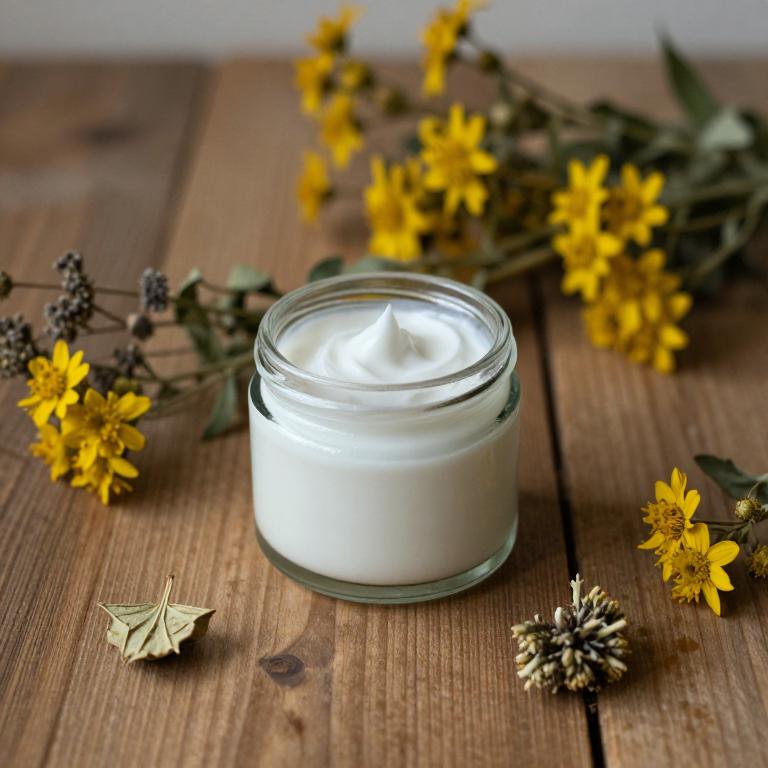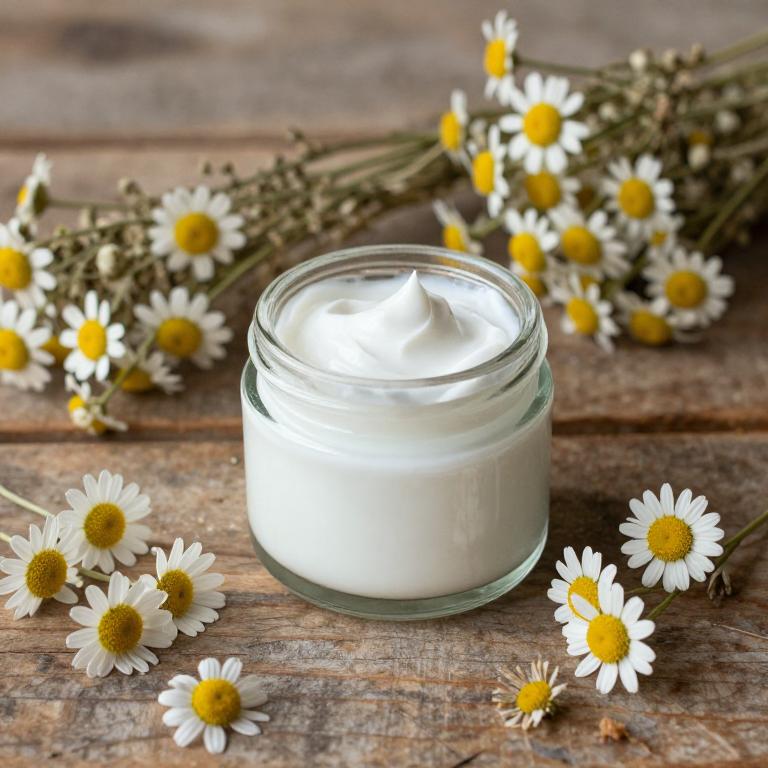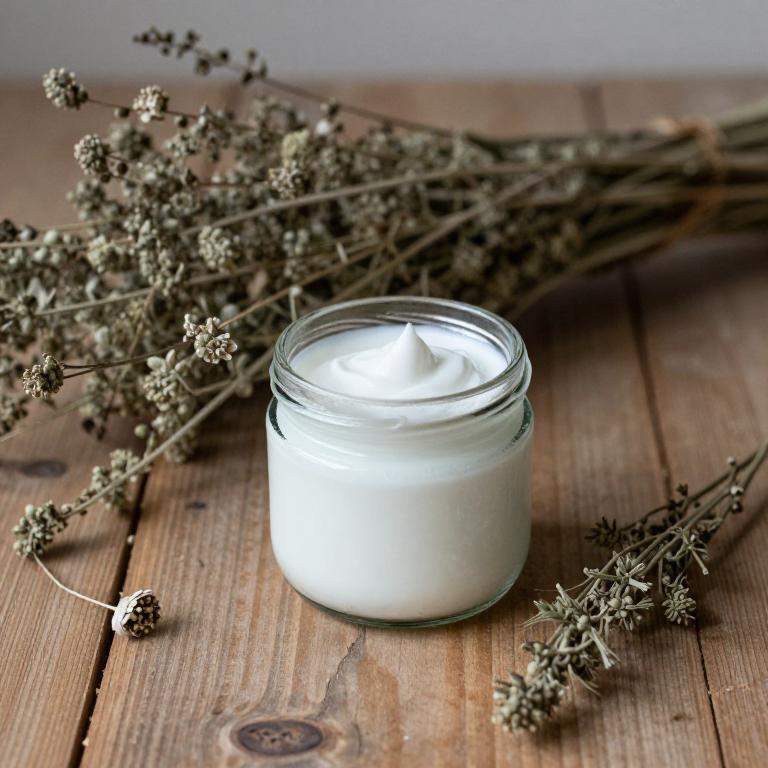10 Best Herbal Creams For Plantar Fasciitis

Herbal creams for plantar fasciitis are natural topical treatments that often contain ingredients like menthol, capsaicin, or essential oils, which can help reduce pain and inflammation.
These creams are typically preferred by individuals seeking alternative or complementary therapies to conventional pain medications. Many herbal formulations also include anti-inflammatory herbs such as turmeric or ginger, which may support the healing process. While they can provide relief, their effectiveness may vary, and it's important to consult a healthcare provider before use, especially if you have sensitive skin or other medical conditions.
Overall, herbal creams can be a soothing option for managing plantar fasciitis symptoms when used as part of a broader treatment plan.
Table of Contents
- 1. Yarrow (Achillea millefolium)
- 2. Ginger (Zingiber officinale)
- 3. Stinging nettle (Urtica dioica)
- 4. Blessed thistle (Cnicus benedictus)
- 5. Mountain arnica (Arnica montana)
- 6. St. john's wort (Hypericum perforatum)
- 7. Salvia (Salvia officinalis)
- 8. Chaste tree (Vitex agnus-castus)
- 9. Chamomile (Matricaria chamomilla)
- 10. Field horsetail (Equisetum arvense)
1. Yarrow (Achillea millefolium)

Achillea millefolium, commonly known as yarrow, has been traditionally used in herbal remedies for its anti-inflammatory and analgesic properties.
When incorporated into herbal creams, it may help alleviate the pain and inflammation associated with plantar fasciitis by reducing swelling and soothing irritated tissues. These creams often combine yarrow with other soothing herbs like comfrey or calendula to enhance their therapeutic effects. While not a substitute for medical treatment, some users report relief from using yarrow-based creams as part of a holistic approach to managing plantar fasciitis.
It is important to consult with a healthcare provider before using any herbal remedy, especially if you have existing health conditions or are taking other medications.
2. Ginger (Zingiber officinale)

Zingiber officinale, commonly known as ginger, has been traditionally used for its anti-inflammatory and analgesic properties, making it a popular ingredient in herbal creams for plantar fasciitis.
These creams typically contain extracts of fresh or dried ginger root, which are believed to help reduce inflammation and alleviate pain in the plantar fascia. The warming effect of ginger in topical applications can improve blood circulation to the affected area, promoting faster healing and reducing stiffness. While some studies suggest that ginger may offer mild relief for musculoskeletal conditions, its effectiveness for plantar fasciitis is still being explored in clinical research.
As with any topical treatment, it is advisable to consult a healthcare professional before using ginger-based creams, especially if you have sensitive skin or are taking other medications.
3. Stinging nettle (Urtica dioica)

Urtica dioica, commonly known as stinging nettle, has been traditionally used in herbal medicine for its anti-inflammatory and analgesic properties.
When incorporated into topical creams, urtica dioica can provide relief for plantar fasciitis by reducing inflammation and pain in the heel and foot. These herbal creams are often made by extracting the active compounds from the leaves and roots of the plant. They are a natural alternative for individuals seeking non-steroidal treatments for chronic pain.
However, it is important to consult a healthcare professional before use, especially if you have allergies or are taking other medications.
4. Blessed thistle (Cnicus benedictus)

Cnicus benedictus, commonly known as sweet cicely, has been traditionally used in herbal medicine for its anti-inflammatory and analgesic properties.
When formulated into creams, Cnicus benedictus can provide targeted relief for plantar fasciitis by reducing inflammation and soothing pain in the heel and foot. The active compounds in the herb, such as apiol and limonene, may help improve circulation and reduce muscle tension in the plantar fascia. While some users report positive results from using these herbal creams, it is important to consult with a healthcare professional before starting any new treatment for plantar fasciitis.
As with any topical remedy, potential allergic reactions or skin irritation should be monitored closely.
5. Mountain arnica (Arnica montana)

Arnica montana herbal creams are commonly used to alleviate pain and inflammation associated with plantar fasciitis, a condition characterized by heel pain and inflammation of the plantar fascia.
These creams typically contain arnica extract, which is believed to have anti-inflammatory and analgesic properties that can help reduce swelling and discomfort. When applied topically, the cream may provide localized relief without the systemic side effects of oral medications. However, it is important to consult a healthcare provider before using arnica products, especially for individuals with sensitive skin or those taking other medications.
While some users report positive results, the effectiveness of arnica montana creams for plantar fasciitis can vary, and they should be used as part of a comprehensive treatment plan.
6. St. john's wort (Hypericum perforatum)

Hypericum perforatum, commonly known as St. John's Wort, is a herbal plant that has been traditionally used for its anti-inflammatory and analgesic properties.
When formulated into creams, it may offer relief for individuals suffering from plantar fasciitis by reducing inflammation and pain in the plantar fascia. These creams typically contain extracts of the plant's flowers, which are rich in hypericin and other bioactive compounds. While some studies suggest potential benefits, more clinical research is needed to confirm their efficacy and safety for long-term use.
As with any herbal remedy, it is advisable to consult a healthcare professional before incorporating hypericum perforatum cream into a treatment plan for plantar fasciitis.
7. Salvia (Salvia officinalis)

Salvia officinalis, commonly known as sage, is often incorporated into herbal creams designed to alleviate symptoms of plantar fasciitis due to its anti-inflammatory and analgesic properties.
These creams typically contain essential oils extracted from the leaves of the plant, which are known to reduce pain and inflammation in the plantar fascia. The application of such creams can provide localized relief, helping to ease morning foot pain and improve mobility for those suffering from this condition. While they are not a substitute for medical treatment, they can serve as a complementary therapy when used alongside other conservative treatments.
However, it is important to consult a healthcare professional before using any herbal remedy to ensure safety and effectiveness.
8. Chaste tree (Vitex agnus-castus)

Vitex agnus-castus, commonly known as chaste tree, has been traditionally used in herbal medicine for its potential anti-inflammatory and pain-relieving properties.
When formulated into creams, these herbal remedies may offer relief for individuals suffering from plantar fasciitis by reducing inflammation and soothing the affected area. The active compounds in vitex, such as flavonoids and essential oils, are believed to promote circulation and ease muscle tension, which can alleviate the discomfort associated with plantar fasciitis. While some users report positive results, it is important to consult with a healthcare professional before using any herbal cream, as individual responses can vary.
As with any treatment, consistency and proper application are key to maximizing the potential benefits of vitex-based plantar fasciitis creams.
9. Chamomile (Matricaria chamomilla)

Matricaria chamomilla, commonly known as chamomile, is a herb often used in the formulation of topical creams for its soothing and anti-inflammatory properties.
These herbal creams are particularly beneficial for individuals suffering from plantar fasciitis, as they can help reduce inflammation and pain in the heel and arch of the foot. Chamomile contains compounds like bisabolol and chamazulene, which have been shown to possess analgesic and anti-inflammatory effects. When applied regularly, these creams may offer natural relief without the side effects associated with some over-the-counter pain medications.
However, it is important to consult with a healthcare professional before using any herbal remedy, especially if you have allergies or are taking other medications.
10. Field horsetail (Equisetum arvense)

Equisetum arvense, commonly known as field horsetail, is a herb rich in silica, which is believed to support tissue repair and reduce inflammation.
Herbal creams containing Equisetum arvense are often used to alleviate the pain and discomfort associated with plantar fasciitis due to their potential anti-inflammatory and analgesic properties. These creams may help improve the flexibility and strength of the plantar fascia, promoting healing over time. While some studies suggest potential benefits, more clinical research is needed to fully confirm their efficacy for this condition.
As with any topical treatment, it is advisable to consult a healthcare professional before use, especially if other symptoms or underlying conditions are present.